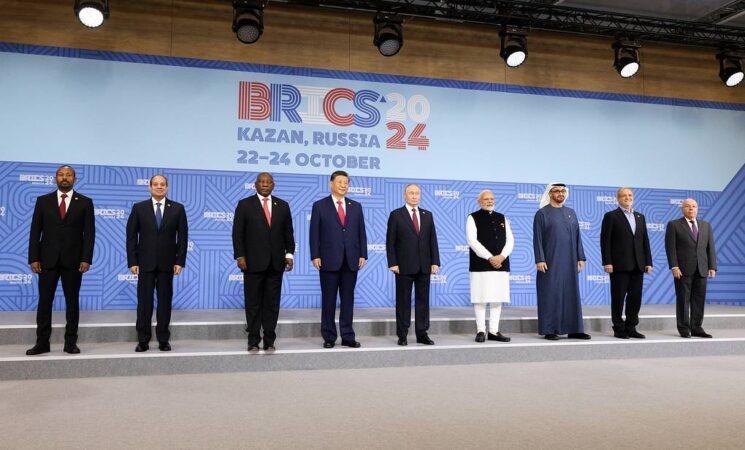1 November 2024, NIICE Commentary 9700
Dr. Chander Shekhar
Days before of an annual BRICS summit being organized by Russia, in Kazan on 22-24 October 2024, under the theme of “Strengthening Multilateralism for Just Global Development and Security”, a report appeared in the BBC saying “Putin gathers allies to show West’s pressure isn’t working”. It further narrates the failure of West “to isolate” Russia after its conflict with Ukraine. Unlike these assumptions, the BRICS thinks differently and has grown by incorporating and expanding its footprints in different continents for shared development and security. It could also become an engine of developing economies and security.
A Growing Pole for the Global South Development
The BRICS (Brazil, Russia, India, China and South Africa) is a multilateral organization, acts as an alternative counterweight to the Bretton Woods institutions managed by the West and has emerged a pole for the development and cooperation of Global South. In last one and half decade since its formation, the organization has played multifaceted roles as geo-economic and geopolitical actor. It has evolved from major four to five countries and now included other countries like Egypt, Ethiopia, Iran, and UAE. Saudi Arabia also joined this plurilateral and inclusive organization, setting tones to work for global south by shelving bilateral differences and looking broader objectives of international peace and security, a successful gathering.
Reports suggest that the forum represent more than 45 percent of world’s population and accounting for 35 percent of global GDP. With its expansion in numbers, the BRICS have become a global forum to discuss issues that matter to the organization, and present an alternative equilibrium in global governance by deepening cooperation and fraternity for bigger objectives. The September 2021 BRICS summit, which was held under Indian leadership, stressed on enhancing “intra-BRICS cooperation”, boosting reforms in multilateral system, peace, security, counter-terrorism cooperation, sustainable goals, people to people exchanges, etc.
These focused areas were also part of the summit in the following years. The 2022 Beijing Declaration of XIV BRICS Summit repeated the previous things and focused on to building “high quality BRICS partners in a new era for Global development”, including fight against poverty, hunger, health care, education, environmental protection, clean water, etc.
Moreover, global south countries were most affected over periods of time due to back-to-back challenges from wars, economic crisis, climate change, etc. Three common features of the global south countries bring them together to resist and achieve objectives: a) an independent political stance, b) historical mission of development and revitalization, and c) common advocacy for justice and fairness. The United Nations’s Global South debate “for revamp of west-led world order” continued and recognized the need to reform it as per time and reflect 21st century’s realities in the organization via annual General Assembly debates.
The rationale of this forum suggests that more than 40 countries expressed their will to join it as gathering of likeminded countries from developing world. In its 16th BRICS Closed Plenary Session, with the confluences of voice of Global South Summits and G20 presidency, it was emphasised that “hopes, aspirations and expectations of the global south countries must also be kept in mind” to reform, “not replace global institutions”, for global commons and shared prosperity. The Washington Post interprets Putin’s global south leaders meeting at BRICS “to counterbalance western clout”.
As far multilateral financial institutions are concerned, Putin expresses on that “no BRICS plan to create alternative to swift banking system”.
This three days summit was attended by over 36 countries leaders which is seen as a successful gathering of enhancing confidence building among states, who are facing bilateral issues as well, and Kremlin described it as “the largest foreign policy event ever held” by Russia in the middle of wars.
The priorities of Russia led summit is focused on promoting comprehensive cooperation in areas such as science, high technology, healthcare, environmental protection, culture, sports, youth exchanges, etc.
India’s Stakes
India, like China and others in the BRICS, has been a stronger voice for the Global South countries at various international organizations. At the onset, India’s commitments are to ‘share its knowledge, experiences, capabilities with all global south countries in order to promote mutual trade, inclusive growth, progress of sustainable development goals, and women-led development’.
During the summit, Indian Prime Minister underlines the pathways for the BRICS by stating that the forum has emerged as an “important platform for dialogue and discussion on issues concerning the global development agenda, reformed multilateralism, climate change, economic cooperation, building resilient supply chains, promoting culture and people to people connect”. This gamut of areas is pivotal for the development of global south countries. Prime facie, the grouping is not aimed to exclude or against any country or organization.
In its latest episode of the 3rd Voice of the Global South Summit, a platform of deliberation on development related issues and priorities, several initiatives by India were underscored to transform and share knowledge with global south countries, namely, Mission LIFE, Dakshin or Global South Excellence Centre, Digital Public Infrastructure, One world-One Health, etc.
Conclusion
In its new avatar, the BRICS has not only made reforms in its organization by including new members, but also set a new baseline for development and cooperation in the global south region as seen in the Kazan Declaration and its special BRICS Plus session under the theme of “BRICS and Global South: Building a Better World Together”. This change in substance and structure would make it a dynamic and an influential major inter-governmental organization that has expanded its scope of works for common prosperity. Given the challenges and concerns of global south countries, the resolution lies in multilateral leadership being provided by the BRICS organization for common future and prosperity.
Dr. Chander Shekhar is an Assistant Professor at PES University, Bangalore, India.

